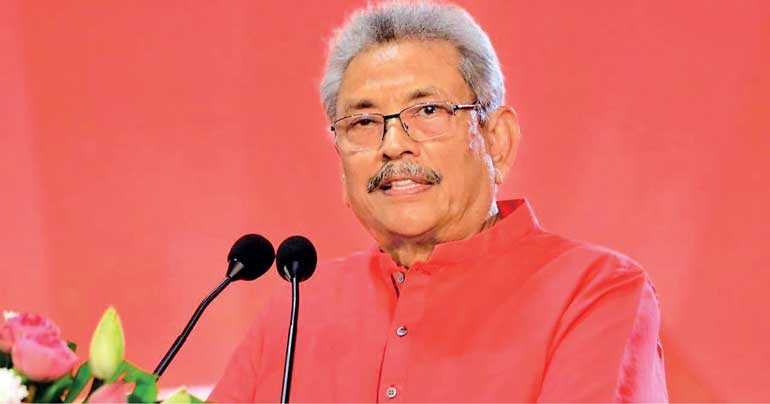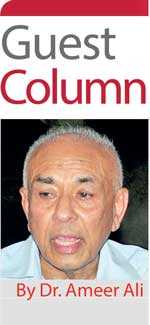Friday Feb 20, 2026
Friday Feb 20, 2026
Tuesday, 25 February 2020 00:00 - - {{hitsCtrl.values.hits}}

The economic situation was actually worsened by PGR because of his impulsive tax and tariff stimulus, purportedly to assist local producers to increase output and reduce prices to bring down the cost of living. The impact of these measures on public finance however, was totally ignored
The Presidential Election of November 2019 was fought entirely on the issue of security. In a sense, Zahran and his suicide mob presented victory to GR on a platter. Was that their genuine intention or were they instrumental in fulfilling the wishes of another party, only history would reveal.
Although the national economy at that time was reeling under low growth, punishing debt, rising income disparity, falling productivity, chronic unemployment, rising cost of living and grinding poverty, none of the contestants, except Anura Kumara Dissanayaka from NPM, was campaigning seriously on possible solutions to the economic crisis. GR and his supporters knew very well that security and scare mongering would be the winning wicket to beat the opponents.
Having achieved victory, PGR’s economic strategy and policies do not show much difference from those adopted by the previous regime. One should not pass judgement hurriedly based on a three-month report card. Although he expects ‘Prosperity with Splendour’ to prevail at the end of his term of office, nowhere has he presented yet his pathway to reach that Valhalla. 
It is a strange irony that the first foreign visit of PGR, with a small team of delegates, was to India, from where he returned with a promise of $ 450 million financial assistance for economic development, while his caretaker PM, or second in command, flew to the same destination with a sizeable 39-member delegation to appeal for moratorium on debt repayments.
One does not know what specific conditions would be attached if India were to concede PM’s request. However, this request is the first official admission that the country is in dire straits economically, if not bankrupt financially. Once a country reveals publicly its inability to payback its debt no new lender would come forward to lend anew without even more stringent conditions.
Impulsive tax and tariff stimulus
The economic situation was actually worsened by PGR because of his impulsive tax and tariff stimulus, purportedly to assist local producers to increase output and reduce prices to bring down the cost of living. The impact of these measures on public finance however, was totally ignored. The caretaker PM also announced that subsidised food would be provided for the poorest of families, and on the instruction of PGR, applications are now entertained for 100,000 public sector employment with minimum salaries.
These measures would no doubt ease at least part of the economic difficulties for tens of thousands of families, but they are only temporary ailments and not permanent cure for the nation’s economic ill-being. There is politics behind these palliatives, and they would no doubt play a key role in attracting votes at the forthcoming General Elections in which PGR expects the PM’s party to emerge with two-third majority, so that the constitution could be re-amended to regain the executive powers lost by the President, because of the 19th Amendment.
However, these palliatives, without counter measures to raise government revenue, will throw public finance into chaos. Given this scenario, one does not need rocket science to predict that there would be serious deterioration in budget deficit. Controlling that run-away deficit would require cutting down public expenditure, raising taxes and reducing transfer payments. It is doubtful whether the pre-election tax reductions would be continued without revision or reversal.
Also, will the new government after the election maintain its subsidised food program and retain the 100,000 jobs permanently? Financing these ad hoc measures would pose new headache to the next government.
The country could go out and borrow from outside, which the PM has already announced; but the request for a moratorium from India would make future borrowings even more costly. With an open economy wedded to economic liberalism, the future of Sri Lanka’s economic growth looks increasingly precarious, in spite of the Central Bank Governor’s courageous optimism and his readiness to tinker with the liberal economic paradigm, to make it more equitable and just. However, he did not fail to qualify his optimism with realism when he called for some hard political decisions.
At present however, and in spite of several setbacks, the economy, according to the World Bank, has reached the upper-middle income category. This categorisation is entirely based on income per capita, which is only an average, and does not reveal much about the internal dynamics of how that income was earned and by whom. Be that as it may, the challenge facing the economy is how to move forward without being trapped at the middle income level.
Higher rate of growth and high income are not automatically guaranteed once an economy reaches middle income status. It is not a virtuous status. As Lee Kwan Yew said once in the context of Singapore, economic growth is like a cyclist riding up hill. It needs more energy and strength as one moves closer and closer to the top.
Massive injection of capital investment
What the economy now needs is a massive injection of capital investment and that investment has to go into high-tech industries and infrastructure development. The manufacturing sector has to move forward from labour intensive consumer oriented industries to at least intermediate producer goods industries. This would require a highly skilled labour force, which in turn demands educational reforms. It also requires a new wage structure to attract talent.
In the 1980s, Lee Kwan Yew deliberately increased salaries of public servants not only to make public sector attractive, but more importantly to force the same in the private sector to remain competitive. In the end, what it actually did was to make the relative cost of capital cheaper compared to labour, which induced private sector to employ more capital and better technology.
In short, there is an absolute need for a comprehensive economic plan with time specified sectoral targets. Unfortunately, PGR does not seem to work on that basis, but issues edicts at random to be implemented practically on everything. It is, like his tax and tariff stimulus, a spasmodic, haphazard, and impulsive approach to systematic economic development. The concept and philosophy of economic planning has fallen into disrepute and disuse after the collapse of the command economies in 1980s.
Free market economics does not entertain any vestiges of that economic strategy. However, to middle income economies open to global shocks, there is a need for coordinated sectoral strategies to achieve higher rate of growth. It does not matter whether one calls it a plan or macro coordination. Economics of cure demands coordinated or planned strategy.
Above all, and in the context of Sri Lanka, economics of cure also demands speedy solution to the vexatious issue of power sharing. This author has laboured on this point more than once, but it deserves reiteration, given PGR’s intention to exclude the minorities politically while including them economically. Some are calling it a pragmatic approach. On the contrary, it is an approach pebbled with arrogance and anger pouring out of an ultra-nationalistic and supremacist ideology, and it can be carried out only with a mixture of force and penalties.
This may be the reason why PGR has already dispatched the armed forces to all districts under the pretext of engaging them in developmental work. Any development strategy not based on spontaneous effort and co-operation from the people to be effected, but on police and military push, is destined to recreate, even if that strategy succeeds, the very issues that that strategy wanted to avoid originally.
Alternatively, power sharing or devolution is a solvable and manageable problem without endangering the territorial integrity of this country, provided there is willingness to consult and compromise by all parties. The stumbling block to this rational approach are the ultra-nationalists, who from the very beginning tried to frustrate any attempt for a solution. The one leader who realised this fact and wanted to move away from them was assassinated. Today, these ultra-nationalists turned supremacists have ensnared PGR and his government into a suffocating political net.
One cannot dismiss this political issue as irrelevant and concentrate entirely on economic growth and development. Men and women do not live by bread alone Mr. President. A number of pressures that Sri Lanka is currently facing internationally stem from this issue. By tackling it head on with courage and determination, and with level headedness, political leaders can at least remove one excuse for foreign interference in our domestic affairs. Let us learn the lessons from history and escape from its revenge.
(The writer is attached to the School of Business and Governance, Murdoch University, Western Australia.)